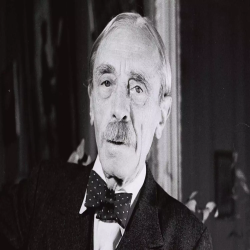
Paul Valéry
French poet and essayist
| Date of Birth | : | 30 Oct, 1871 |
| Date of Death | : | 20 Jul, 1945 |
| Place of Birth | : | Sète, France |
| Profession | : | Poet, Philosopher, Journalist, Essayist, Academic |
| Nationality | : | French |
Ambroise Paul Toussaint Jules Valéry (French: pɔl valeʁi) was a French poet, essayist, and philosopher. In addition to his poetry and fiction (drama and dialogues), his interests included aphorisms on art, history, letters, music, and current events. Valéry was nominated for the Nobel Prize in Literature in 12 different years.
Biography
Valéry was born to a Corsican father and Genoese-Istrian mother in Sète, a town on the Mediterranean coast of the Hérault, but he was raised in Montpellier, a larger urban center close by. After a traditional Roman Catholic education, he studied law at university and then resided in Paris for most of the remainder of his life, where he was, for a while, part of the circle of Stéphane Mallarmé.
In 1900, he married Jeannine Gobillard, a friend of Stéphane Mallarmé's family, who was also a niece of the painter Berthe Morisot. The wedding was a double ceremony in which the bride's cousin, Berthe Morisot's daughter, Julie Manet, married the painter Ernest Rouart. Valéry and Gobillard had three children: Claude, Agathe and François.
Valéry served as a juror with Florence Meyer Blumenthal in awarding the Prix Blumenthal, a grant given between 1919 and 1954 to young French painters, sculptors, decorators, engravers, writers, and musicians.
Though his earliest publications date from his mid-twenties, Valéry did not become a full-time writer until 1920, when the man for whom he worked as private secretary, a former chief executive of the Havas news agency, Edouard Lebey, died of Parkinson's disease. Until then, Valéry had, briefly, earned his living at the Ministry of War before assuming the relatively flexible post as assistant to the increasingly impaired Lebey, a job he held for some twenty years.
Work
The great silence
Valéry is best known as a poet, and he is sometimes considered to be the last of the French symbolists. However, he published fewer than a hundred poems, and none of them drew much attention. On the night of 4 October 1892, during a heavy storm, Paul Valéry underwent an existential crisis, an event that made a huge impact on his writing career. Eventually, around 1898, he quit writing altogether, publishing not a word for nearly twenty years. This hiatus was in part due to the death of his mentor, Stéphane Mallarmé. When, in 1917, he finally broke his 'great silence' with the publication of La Jeune Parque, he was forty-six years of age.
La Jeune Parque
This obscure, but sublimely musical, masterpiece, of 512 alexandrine lines in rhyming couplets, had taken him four years to complete, and it immediately secured his fame. With "Le Cimetière marin" and "L'Ébauche d'un serpent," it is often considered one of the greatest French poems of the twentieth century.
The title was chosen late in the poem's gestation; it refers to the youngest of the three Parcae (the minor Roman deities also called The Fates), though for some readers the connection with that mythological figure is tenuous and problematic.
The poem is written in the first person, and is the soliloquy of a young woman contemplating life and death, engagement and withdrawal, love and estrangement, in a setting dominated by the sea, the sky, stars, rocky cliffs, and the rising sun. However, it is also possible to read the poem as an allegory on the way fate moves human affairs or as an attempt to comprehend the horrific violence in Europe at the time of the poem's composition. The poem is not about World War I, but it does try to address the relationships between destruction and beauty, and, in this sense, it resonates with ancient Greek meditations on these matters, especially in the plays of Sophocles and Aeschylus. There are, therefore, evident links with le Cimetière marin, which is also a seaside meditation on comparably large themes.
In other literature
One of three epigraphs in Cormac McCarthy's novel Blood Meridian is from Valéry's Writing at the Yalu River (1895): "Your ideas are terrifying and your hearts are faint. Your acts of pity and cruelty are absurd, committed with no calm, as if they were irresistible. Finally, you fear blood more and more. Blood and time".
In the book "El laberinto de la soledad" from Octavio Paz there are three verses of one of Valéry's poems:
Je pense, sur le bord doré de l’univers
A ce gout de périr qui prend la Pythonisse
En qui mugit l’espoir que le monde finisse.
In popular culture
Oscar-winning Japanese director Hayao Miyazaki's 2013 film The Wind Rises and the Japanese novel of the same name (on which the film was partially based) take their title from Valéry's verse "Le vent se lève... il faut tenter de vivre !" ("The wind rises… We must try to live!") in the poem "Le Cimetière marin" (The Graveyard by the Sea). The same quote is used in the closing sentences of Anthony Burgess's 1962 novel The Wanting Seed.
Quotes
Total 20 Quotes
Poems are never finished - just abandoned.
Politeness is organized indifference.
The best way to make your dreams come true is to wake up.
God made everything out of nothing. But the nothingness shows through.
Love is being stupid together.
To see is to forget the name of the thing one sees.
Books have the same enemies as people: fire, humidity, animals, weather, and their own content.
Sometime I think; and sometime I am.
God created man and, finding him not sufficiently alone, gave him a companion to make him feel his solitude more keenly.
Our most important thoughts are those that contradict our emotions.
